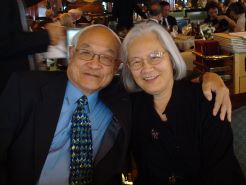
Hsieh Wen Shen
Professor Emeritus of Environmental Engineering
Dr. Hsieh Wen Shen, professor emeritus of environmental engineering, passed away on December 2, 2021. He was 90 years old.
Hsueh Wen Shen was born in Beijing (then called Peking), China, on July 13, 1931. He attended high school in Shanghai, and studied engineering at the University of Michigan, where he met Clare, who was earning a B.A. in economics. They married in 1956.
When he graduated from the University of Michigan they put his first name on his transcript as Hsieh Wen. He asked for this to be corrected and the university told him it would be easier for him to have his name legally changed to the spelling they had used than for them to change his transcript. He did as they suggested and has used the spelling Hsieh Wen ever since.
After Clare completed her masters of library science, the Shens moved to Berkeley, in 1957. When he arrived, he wanted to see if an acclaimed professor of hydraulic engineering would take him on as a doctoral student. He was directed to find “the one who wears a brown suit.” To his delight, the brown-suited man — Professor Hans Albert Einstein, son of Albert Einstein — offered him both admission and a scholarship.
Professor Shen received his Ph.D. from UC Berkeley in 1961. He served on the faculty at Colorado State University for 18 years, before coming to Cal in 1985. He was a leader in the areas of environmental hydraulics, river mechanics, and basic sediment transport.
Shen was most known for his work to restore southern Florida’s Kissimmee River, the once-meandering 103-mile long river that was channeled into a canal in the 1960s. While the channelization provided flood protection to surrounding properties, it destroyed much of the ecosystem that supported endangered species, and other native fish and animals. Shen was part of the team of engineers and ecologists that worked to bring back the birds, fish, and riparian plants to the river, an effort that continues to this day and has made substantial progress.
Shen also played a vital role in research of the San Francisco Bay, spearheading an agreement between the University of California and the U.S. Army Corps of Engineers. The agreement allowed University engineers to conduct research using the unique one-acre Bay Model in Sausalito, and laid the foundation for research that focused on boosting environmental research within the San Francisco Bay.
In 1993, Shen was elected to National Academy of Engineering, the highest professional honor for an American engineer. He was recognized for the “development of flow control and release plans of reservoirs to restore and enhance the ecological environment of rivers.” Shen also won the Joan Hodges Queneau Palladium Medal, an extraordinary honor from the National Audubon Society and the American Association of Engineering Societies for cooperation between engineers and environmentalists. In addition, he received the Alexander Humboldt Foundation Senior Distinguished U.S. Scientist Award, as well as the H.A. Einstein Award from the American Society of Civil Engineers.
Shen was also active philanthropically. In 1974, he assisted Lyle F. Mockros in the creation of the Hans Albert Einstein Memorial Fund, as a way to recognize his Berkeley dissertation supervisor. More recently, he and his wife Clare established an endowed engineering professorship, Hsieh Wen says, because “we started from scratch, without much money, and we are so grateful to UC Berkeley.”
Professor Shen is survived by his wife, Clare Shen; his son, Anthony Shen; his daughter, Eveline Shen; and two grandchildren.
Pam Ong
Paul Vojta
and others
2023
